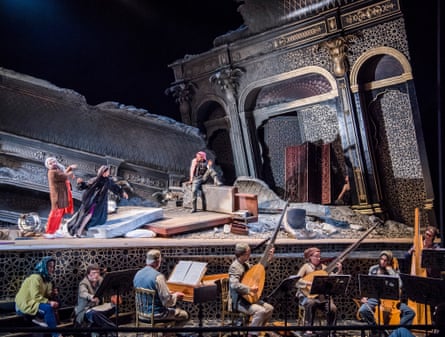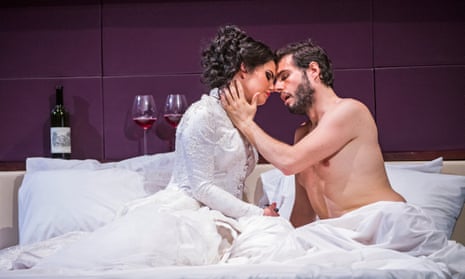The modern rediscovery of Francesco Cavalli has been rather fitful and piecemeal. The Venetian composer, a protege of Monteverdi, is known to have composed at least 32 operas, of which half a dozen are lost, and there are almost certainly more treasures to be found among the ones that have still to unearthed. Glyndebourne, having launched the Cavalli revival in Britain almost half a century ago with stagings of L’Ormindo and La Calisto, opens its new summer season with the UK premiere of Hipermestra, which was first performed in Florence in 1668 but only seen once since.
Hipermestra is one of the 50 daughters of Danao, king of Argos, who are married off by their father to the 50 sons of his brother Egitto, with orders to murder their husbands on their wedding nights; an oracle has predicted that Danao will be killed by one of his daughters’ lovers. All obey apart from Hipermestra, who refuses to kill her husband, Linceo, and is incarcerated by her father as a result. Linceo escapes and, tricked into thinking that Hipermestra has been unfaithful, takes revenge on Danao, laying waste to everything in his kingdom.
Hipermestra herself is certainly the epitome of a tragic, traduced operatic heroine, but the work turns out to be very dramatically and musically uneven. There is a beautiful duet for the lovers early in the first act and a glorious quartet of reconciliation in the closing scene, but otherwise the memorable musical numbers are few and far between. Most of the intervening three hours is filled by recitative, some of it highly expressive, which threatens to morph into fully fledged aria but rarely does. Dramatically, the opera loses its way in the second act, when the Glyndebourne production also briefly falters.
It is directed by Graham Vick, back at Glyndebourne for the first time since he signed off as director of productions there with a controversial staging of Don Giovanni 17 years ago. He sets Hipermestra somewhere in the Middle East today and, while carefully avoiding specific references to religion, conceives it as a power struggle between neighbouring oil-rich states, conjuring up a brutal 21st-century world in which women are still chattels to be treated as any man thinks fit. The production begins before anyone has entered the theatre, with some of the 50 newlywed couples being photographed in the Glyndebourne gardens. On stage, Stuart Nunn’s designs begin with sumptuous palace interiors, a giant wedding cake and an arch of pink and white balloons and, after razor wire and a burning lorry, they end with a rubble-strewn image of total destruction.

If Vick can’t quite overcome the dramatic unevenness of Cavalli’s score, it is hard to imagine a better performance than this. Conducting from the harpsichord, William Christie and the nine-piece orchestra become very much part of the production, with instrumentalists regularly summoned on stage. The cast is a fine one too, led by Emöke Baráth in the title role, and Raffaele Pe as Linceo; both take all of the opportunities the score offers them, as do Renato Dolcini as Danao, Benjamin Hulett as Hipermestra’s disappointed lover, Arbante; bearded and in drag, Mark Wilde is splendid as her cynical nurse, Berenice, who provides the much needed moments of knockabout humour. You’re unlikely to see this rarity better staged anywhere, though whether you need to see it at all is another matter.

Comments (…)
Sign in or create your Guardian account to join the discussion